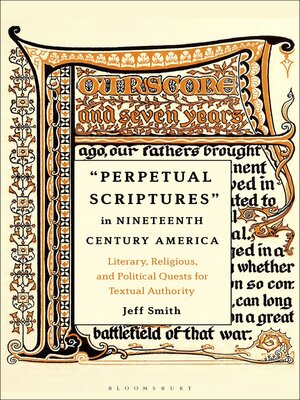Perpetual Scriptures in Nineteenth-Century America
ebook ∣ Literary, Religious, and Political Quests for Textual Authority
By Jeff Smith

Sign up to save your library
With an OverDrive account, you can save your favorite libraries for at-a-glance information about availability. Find out more about OverDrive accounts.
Find this title in Libby, the library reading app by OverDrive.



Search for a digital library with this title
Title found at these libraries:
| Library Name | Distance |
|---|---|
| Loading... |
In the tumultuous decades of rapid expansion and change between the American Founding and the Civil War, Americans confronted a cluster of overlapping crises whose common theme was the difficulty of finding authority in written texts. The issue arose from several disruptive developments: rising challenges to the traditional authority of the Bible in a society that was intensely Protestant; persistent worries over America's lack of a "national literature" and an independent cultural identity; and the slavery crisis, which provoked tremendous struggles over clashing interpretations of the Declaration of Independence and the Constitution, even as these "parascriptures" were rising to the status of a kind of quasi-sacred secular canon.
At the same time but from the opposite direction, new mass media were creating a new, industrial-scale print culture that put a premium on very non-sacred, disposable text: mass-produced "news," dispensed immediately and in huge quantities but meant only for the day or hour. Perpetual Scriptures in Nineteenth-Century America identifies key features of the writings, careers and cultural politics of several prominent Americans as responses to this cluster of challenges. In their varied attempts to vindicate the sacred and to merge the timeless with the urgent present, Joseph Smith, Ralph Waldo Emerson, Margaret Fuller, Theodore Parker, Harriet Beecher Stowe, Walt Whitman, Frederick Douglass, Martin Delany, Abraham Lincoln, and other religious and political leaders and men and women of letters helped define American literary culture as an ongoing quest for new "bibles," or what Emerson called a "perpetual scripture."
At the same time but from the opposite direction, new mass media were creating a new, industrial-scale print culture that put a premium on very non-sacred, disposable text: mass-produced "news," dispensed immediately and in huge quantities but meant only for the day or hour. Perpetual Scriptures in Nineteenth-Century America identifies key features of the writings, careers and cultural politics of several prominent Americans as responses to this cluster of challenges. In their varied attempts to vindicate the sacred and to merge the timeless with the urgent present, Joseph Smith, Ralph Waldo Emerson, Margaret Fuller, Theodore Parker, Harriet Beecher Stowe, Walt Whitman, Frederick Douglass, Martin Delany, Abraham Lincoln, and other religious and political leaders and men and women of letters helped define American literary culture as an ongoing quest for new "bibles," or what Emerson called a "perpetual scripture."







